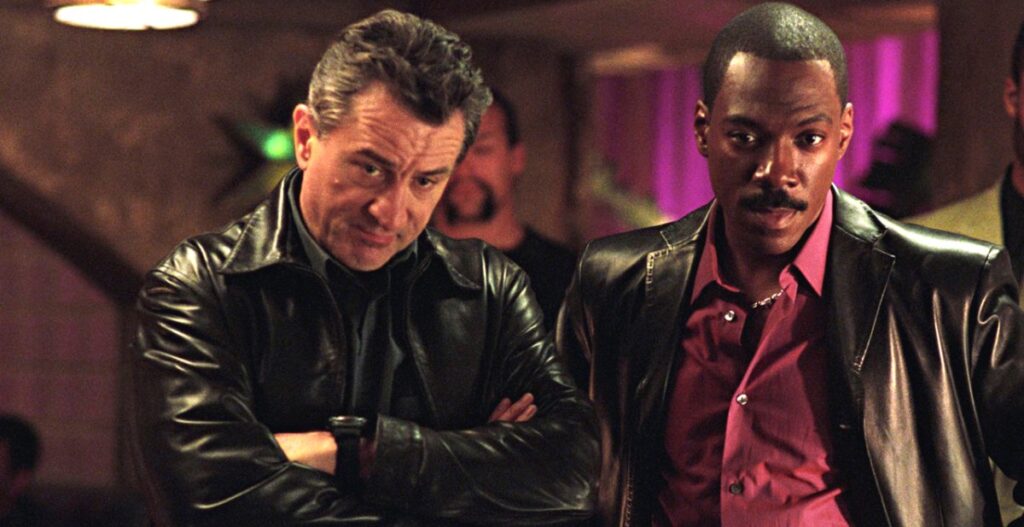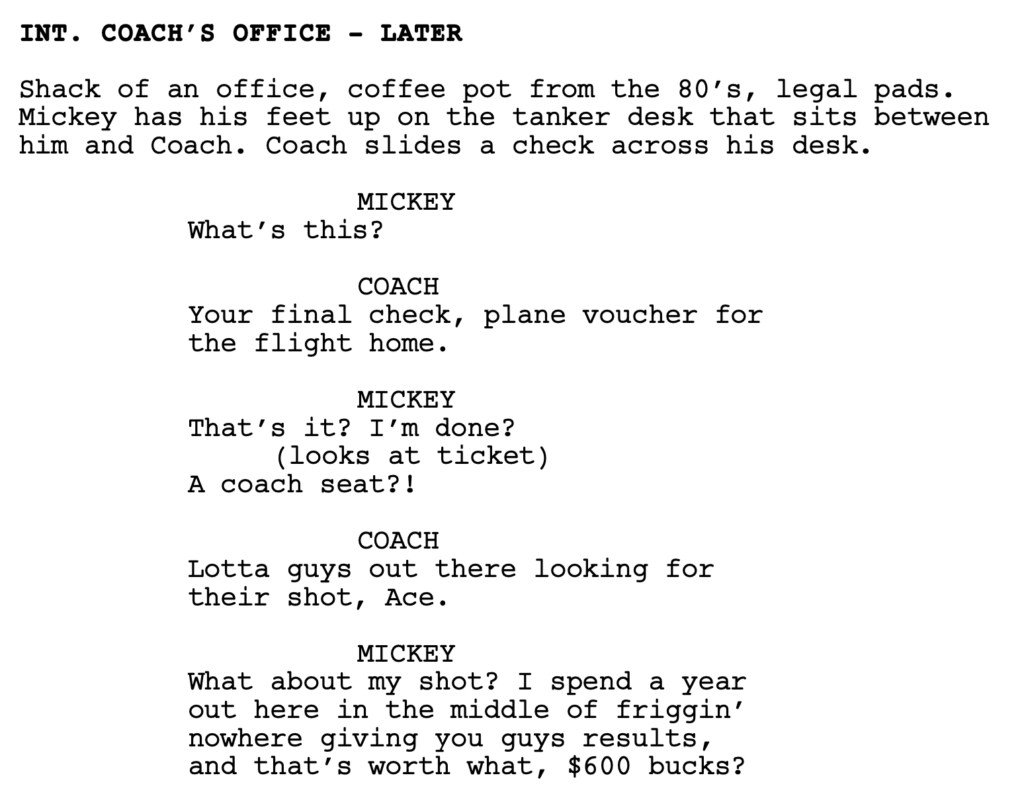Genre: Sports Drama/Comedy
Premise: Mickey Bradley, a wildly talented minor league baseball player in his early twenties who returns home to Los Angeles after an injury and coaches a little league team full of misfits who remind him why he fell in love with baseball in the first place. And there’s a sweet romance in there too.
About: This script comes out of 2020’s Black List. The writer, Ethan Dawes, wrote and directed a small indie film in 2013 called Go For Broke. He was also Carrie-Anne Moss’s assistant in The Matrix Resurrections. Random factoid that has nothing to do with today’s script – Moss just signed on to the new Star Wars show, The Acolyte!
Writer: Ethan Dawes
Details: 107 pages
 MBJ for Mickey?
MBJ for Mickey?
There are certain staples in the studio release cycle that will never die. The “Adult Has-Been Forced to Coach A Kid’s Sports Team” flick is one of those. The reason I bring that up is because, as a screenwriter, you wanna be strategic about what you write. You want to look for the types of scripts that fit into the slots that Hollywood likes making.
I read this old article that Scott posted in the comments yesterday about a struggling screenwriter who surprisingly sold his script, Showtime (that reality TV cop movie starring DeNiro and Murphy), and noticed something interesting within the article.
The script wasn’t the writer’s idea. Someone suggested it to him. He admits he never would’ve written an idea like Showtime otherwise. Afterwards, he tried to sell a script about a 15 year old kid who lived on a floating casino. It didn’t sell. After that, it took him 17 years to get another movie made. And that was another out-there idea – some sort of 70s period piece about Steve McQueen stealing money from a secret fund of Richard Nixon’s.
The only idea that seems to have done anything for this writer was one that someone else came up with. And say what you want about that move – Showtime – but it very much falls into a slot of movies that Hollywood loves to make. Buddy-cop movies. And it was a fairly inventive spin on the genre at the time. So I can see why it got made.

This is a long way of saying that we can get so obsessed by and blinded by our own ideas that we don’t ask the question – does Hollywood actually make the type of movie I’m writing? Cause if they don’t, you’re turning already bad odds into insurmountable odds.
We can make fun of how cliched today’s genre is. But at least this writer is playing to win. Whereas so many aspiring screenwriters are playing to lose.
Mickey is 13 years old pitching to win the Little League World Series when the Japanese team hits a home run off of him to win the game. 15 years later, 28 year old Mickey (hey, didn’t we just cover a Mickey in yesterday’s review??) is pitching in the minor leagues and tears his something-or-other muscle. He’s quickly dropped from the team.
Mickey heads back to the valley in Los Angeles to pick up the pieces and figure out what to do next. After a video goes viral of Mickey throwing a fit in the locker room after getting cut, his agent suggests that he rebuild his image by coaching the same little league team that he played on as a kid. Mickey figures, “why not?” only to learn that the team is now made up of almost entirely girls!
It’s a bit of “A League of Their Own” mixed with “Bad News Bears.” Mickey can’t see himself coaching a bunch of girls but he’s got to rehabilitate that image so he signs on. Naturally, all the girls are terrible (one of them likes singing in the outfield more than catching balls) except for the studly chick who hangs around the park and isn’t on the team… yet!
With a little help from his old catcher, Pickles, and the cute older sister of one of his players, Mickey will have to stop being so serious about the sport and learn how to have fun! If he can figure out that little life hack, he may finally realize that the real wins in life come on the inside, not the outside.
What can I say?
This was a really smart idea to write a script about.
Same old formula. But instead of a boys team, you make it a girls team. I don’t know if it’s possible to tailor something to 2020s Hollywood better than that! Dawes probably reserved his spot on the Black List months beforehand by alerting Franklin Leonard to what he was writing. “Boys bad, girls good!!??” Franklin responded. “You’re in!!”
That had to be how it happened, because if you actually read this script, you saw that nothing else changed. Minus the gender-swap, it’s the exact same Bad News Bears formula.
I don’t know how I feel about that. As someone who critiques screenwriting, I want more. I want originality. I want the writer to push themselves. As someone who closely monitors the business, however, I respect the hustle. The writer knows he doesn’t have to do anything extra here. He gave us the “different” in “the same but different” equation. Why stress yourself beyond that?
As for the writing overall, it was decent but not exceptional.
A reminder to Ethan and all screenwriters out there to be aware of the reader experience. Writers are often so in their heads, they’re not gauging how their writing is being received. If you’re too cavalier about this, you can leave confusing moments on the page. Or moments that cause the reader hiccups. Here’s an example. In this scene, Mickey gets fired from his minor league team…

Mickey says, “Im done?” So we know he’s being let go. The next line is, “A coach seat?” The first thing that I thought of, in that moment, was, “Oh, they’re asking him to retire as a player and become a coach.” Because what else would “coach” mean in this context? But then I realize, “Oh… he’s talking about a coach seat on the plane.”
I get it. You want to get the “coach seat” line in there to emphasize how little they value him. But if it’s going to confuse the reader or cause a hiccup, is it worth it? I say it isn’t.
Now it’s true that the parenthetical in there tells us to focus on the ticket, which helps stave off potential confusion. But here’s something that writers may not know: Readers are not reading your script like it’s some classic novel where they’re savoring every syllable like a fine wine. Their eyes are moving down the page fast.
Most readers don’t even read parentheticals. Not because they’re lazy. But because they’ve read so many scripts in the past where writers use parentheticals superfluously. They don’t tell us anything we don’t already know. So we skip them.
Just watch out for that stuff.
To show you that I’m not picking sides here, soon after that scene, Mickey flies back to Los Angeles. The writer uses 3 lines – just 3 lines – to create one of the clearest characters I’ve read all month. Here’s that moment in the script.

By far, the best way to create a strong and clear character is through a strong and clear introduction. Tell me you don’t know exactly who Mickey’s mother is after this scene. Any mom who will show up at the airport for her son, after he’s been let go, and bring a sign with her that highlights how great she thinks he is? That’s the most supportive mom ever. So we immediately know she’s a great mom and that these two have a great relationship. IN JUST 3 LINES!!!
That’s awesome writing!
But let’s be real. This concept, while marketable, is so susceptible to cliche that even when you swap in an entirely different gender, it still feels dated and predictable. Maybe if Mickey had been a more interesting character, it might’ve worked. But he’s pretty generic.
Ted Lasso has really raised the bar for sports comedy. And Here Come The Bandits couldn’t reach that bar if all its players stood on top of each other.
This script didn’t have anything beyond the smart marketing strategy.
[ ] What the hell did I just read?
[x] wasn’t for me
[ ] worth the read
[ ] impressive
[ ] genius
What I learned: Weird ideas (like 15 year olds living on fictional floating gambling islands) should be treated experimentally, not as legitimate attempts to make it in the business. Don’t spend too much time on these scripts. Accept that they will probably only be used as writing samples. If you have that attitude, you’ll be fine. But don’t spend an entire year writing a period piece about Steve McQueen trying to steal money from a secret presidential fund that only exists in your mind. It’s not an efficient way to spend your time as a screenwriter and is only going to lead to frustration. Spend the bulk of your time writing movies THAT HOLLYWOOD ACTUALLY MAKES. Today’s script is an example of one of those movies.
Logline Rewrite: The logline I included at the top of the review comes from the Black List and was likely written by a first-time manager. Here’s what the logline should’ve been — After a devastating injury, a tough traditional-minded baseball player returns home to coach his former little league team, only to find out that it’s become an all-girls squad.
Get a logline consultation for $25. It includes a 1-10 rating, a 150-200 word analysis, and a logline rewrite. Improve your logline from that awful version at the beginning of this review, to the one I just wrote above. E-mail me at carsonreeves1@gmail.com (5-pack of logline consults for $75!)

